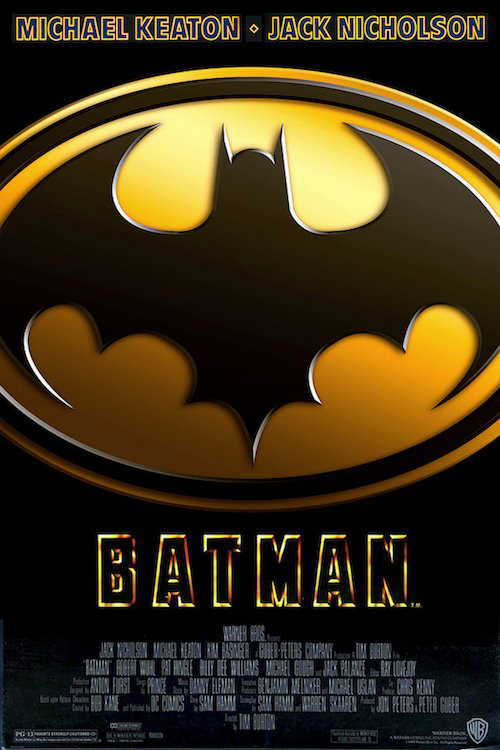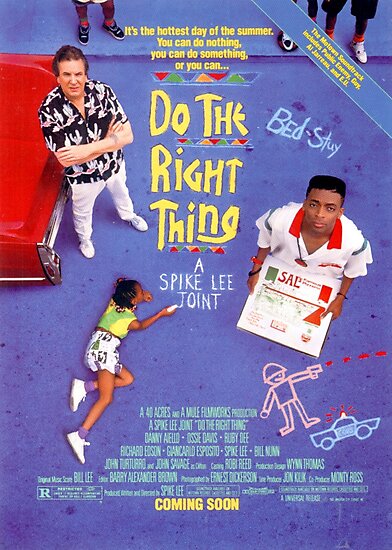
5. The Little Mermaid
Though the Disneyfication process stripped the story of its most searing moments (the mermaid's legs causing her pain, the prince marrying another woman, the mermaid dissolving into foam), what's left still provides a more enjoyable viewing experience than the average animated feature.
4. Batman

For the 16 years between its release and the arrival of the Dark Knight Trilogy in 2005, Batman offered the definitive cinematic take on the Caped Crusader that none of its sequels ever came close to duplicating and set a standard for comic book movies that immediately rendered every one that preceded it embarrassingly obsolete. And no comic book film surpassed its quality until 1998's Blade. More than a mere movie, Batman was a pop culture phenomenon that was reflected in everything from t-shirts to haircuts to tattoos. Starting even before the film's June 1989 release, $750 million in Bat-products were sold.
Unlikely star and former stand-up comic Michael Keaton instantly eclipsed Adam West as the consummate Batman - though his version of the crime-fighter's alter-ego, Bruce Wayne, left a lot to be desired. Thousands of comics fans petitioned the studio to recast the role. And while the late Heath Ledger's portrayal of the Joker casts an almost inescapable shadow over all subsequent depictions of the character, Jack Nicholson's turn as the Clown Prince of Crime in 1989 made the idea of any other actor inhabiting the role seem unthinkable. Although the campy 1960s "Batman" television series was popular enough to run for three seasons, the show's entire history was wisely ignored in favor of an origin story for both the antihero and the villain. However, the decision to have Bruce Wayne's parents murdered by the Joker, as opposed to Joe Chill (the killer in the comics), caused an uproar among comics fans.
It's possible that Tim Burton's gritty vision of a superhero, partly inspired by Frank Miller's even grittier "The Dark Knight Returns", couldn't have been created by any other director of the time. I mean, this is a guy who jumped at the chance to direct a film whose title character is a crude, perverted ghost (Beetlejuice). Burton contrasted the brightness of the Superman movies, which feature mostly daytime scenes with an exceedingly dark atmosphere in a story that takes place mostly at night.
Not satisfied with merely an unconventional tone and look, Burton also defied tradition with Batman's sound as well. Instead of recruiting the master of adventure movie music, John Williams, Burton turned to two rock stars. Former Oingo Boingo lead singer Danny Elfman composed the film's score while none other than Prince oversaw the soundtrack, with many of his songs showing up in the final edit.
At the time of its release, Batman was the 5th highest-grossing movie of all time, which guaranteed that the lone film would be expanded into a franchise.
On a personal note -- when a friend of mine got her first dvd player, the very first movie she bought was Batman.
Batman may no longer be the Batman but it's definitely the foundation upon which the legendary vigilante's multi-billion dollar movie career is built. Batman was named after its hero but the villain got all of the best lines, such as:
"Wait'll they get a load of me."
"Where does he get those wonderful toys?"
"Where does he get those wonderful toys?"
"This town needs an enema!"
"Ever dance with the devil in the pale moonlight?"
3. Lean On Me

This Sports Illustrated documentary chronicles Michael Jordan's career up to his fourth year in the NBA and features him dominating the league even before he won any of his 6 professional championships.
1. Do the Right Thing

Do the Right Thing was released 30 years ago and sadly, it's as timely as ever. Inspired by then-recent front-page stories about African Americans being killed either by police officers or white mobs, Do the Right Thing is director Spike Lee's third feature, following She's Gotta Have It and School Daze. While those two films explored topics such as casual sex, classism within the African American community, colorism and student activism, Do the Right Thing provided fiery social commentary on everything from gentrification and alcoholism to racism and police brutality.
While Spike Lee has filled supporting roles in several of his films, Do the Right Thing is only one of two of his releases in which he stars.
Set in the writer/director's beloved Brooklyn, Do the Right Thing is the story of one especially hot summer day on one street in the borough's Bedford-Stuyvesant section that begins like any other and ends in horrifying tragedy.
Early in the day, while visiting local eatery Sal's Famous Pizzeria, neighborhood resident and b-boy Buggin' Out, asks the shop's owner why his "Wall of Fame", which features pictures of several Italian American celebrities, doesn't include any African Americans. When Sal, who lives in predominantly Italian American Bensonhurst instead of Bedford-Stuyvesant, refuses to add African Americans, Buggin' Out attempts to organize a protest, which is only supported by two of his neighbors: "Radio" Raheem, a taciturn, muscle-bound young man who constantly plays militant rap group Public Enemy's protest anthem "Fight the Power" loudly on his boombox; and "Smiley", a developmentally disabled man with a speech impediment who spends his days selling pictures of slain civil rights leaders Martin Luther King Jr and Malcolm X.
Meanwhile, the daytime deejay at a local radio station, Mister Senor Love Daddy, provides regular updates on the steadily rising temperature and commentary on the events that he sees outside of his window.
Later, "Mookie", a 25-year-old delivery guy who works at Sal's (the only employee who's not family), which has been in the predominantly African American neighborhood as long as Mookie has, argues with his employer's oldest son Pino about race. Pino subsequently urges Sal to move the store to another area, citing his contempt for African Americans, from whom the vast majority of the pizza parlor's revenue is derived. And when Sal shares a friendly exchange with Mookie's younger sister, Jade, with whom he shares an apartment, big brother cautions her to keep her distance from his boss.
That evening, Buggin' Out, accompanied by Radio Raheem and Smiley, shows up at the pizza shop and informs Sal of his intention to call for a boycott of the latter's business if he doesn't add pictures of African Americans to his wall. An argument then ensues, with Buggin' Out and Sal trading racial slurs. Angered, Sal destroys Raheem's box with his baseball bat, prompting the latter to attack him. Pino and his brother Vito, in turn, attack Raheem. Police arrive during the fight and immediately subdue Buggin' Out and Raheem, one of whom kills the latter with an illegal choke-hold in full view of a swiftly gathering crowd. After the officers leave with Buggin' Out and Radio Raheem's body, Mookie throws a garbage can through Sal's front window, prompting the crowd to storm the shop and destroy the contents. Smiley, who joins the rioters, proceeds to set the pizza place on fire. Longtime local resident "Da Mayor" defends Sal and his sons from the wrath of the crowd shortly before firefighters arrive to battle the blaze and prevent the rioters from destroying the nearby Korean-owned grocery as well. However, when riot police show up, they direct the firemen to turn their hoses on the assembled neighborhood residents. Smiley makes his way into the burned-out building and attaches one of his pictures to Sal's "Wall of Fame".
The following day, after arguing with Tina, the Puerto Rican mother of his son, Hector, Mookie returns to the pizza parlor to demand his paycheck from Sal, which ignites an argument between the two. Senor Love Daddy then dedicates a song to Raheem.
The film ends with two quotes about violence. One, from Martin Luther King, Jr.:
"Violence as a way of achieving racial justice is both impractical and immoral. It is impractical because it is a descending spiral ending in destruction for all. The old law of an eye for an eye leaves everybody blind. It is immoral because it seeks to humiliate the opponent rather than win his understanding; it seeks to annihilate rather than to convert. Violence is immoral because it thrives on hatred rather than love. It destroys community and makes brotherhood impossible. It leaves society in monologue rather than dialogue. Violence ends by destroying itself. It creates bitterness in the survivors and brutality in the destroyers."
The other, from Malcolm X:
"I think there are plenty of good people in America, but there are also plenty of bad people in America and the bad ones are the ones who seem to have all the power and be in these positions to block things that you and I need. Because this is the situation, you and I have to preserve the right to do what is necessary to bring an end to that position, and it doesn't mean that I advocate violence, but at the same time I am not against using violence in self-defense. I don't even call it violence when it's self-defense, I call it intelligence."
The quotes are followed by a dedication to the following African American victims of racial violence, including murder-by-cop: Michael Stewart, Edmund Perry, Michael Griffith, Arthur Miller Jr., Eleanor Bumpurs and Yvonne Smallwood.
At the time of its release, reviewers and media publications covering the film voiced concerns that the movie might incite African American audience members to riot. However, no violence surrounding the film was ever reported and Lee himself criticized the racist suggestion that African Americans were so lacking in self-control; civility; and the ability to distinguish between life and fiction that they'd be moved to violence by imaginary drama.
Thoroughly contemporary in its time, decades later Do the Right Thing provides a snapshot of late 1980s inner-city living and style, replete with box haircuts and Air Jordans before they were retro. This is also a time before noise pollution fines kept guys like Radio Raheem from holding walking rap concerts on neighborhood sidewalks. Today, not only would Radio Raheem wear earbuds but his neighbors likely would've captured his murder on their cellphones to be uploaded for the world to see -- though the police officer responsible might still go unpunished.
Do the Right Thing is notable for featuring comedian Martin Lawrence and choreographer-turned-actress Rosie Perez in their first film roles. While the movie received Oscar nominations for Best Original Screenplay and Best Supporting Actor (for Danny Aiello), it's widely believed that Do the Right Thing was snubbed by the Academy of Motion Picture Arts and Sciences for a Best Picture nomination. The award ultimately went to Driving Miss Daisy (which is widely regarded as racially-insensitive), which beat out Born on the Fourth of July, Dead Poets Society, Field of Dreams and My Left Foot at the 62nd annual Academy Awards ceremony on March 26, 1990.
In 2014, President Barack Obama revealed that Do the Right Thing was the movie that he took wife Michelle to see on their first date.
Do the Right Thing is also noteworthy for featuring Public Enemy's classic protest song "Fight the Power", which Radio Raheem plays throughout the film.
Originally Posted 3/4/19
Originally Posted 3/4/19


No comments:
Post a Comment